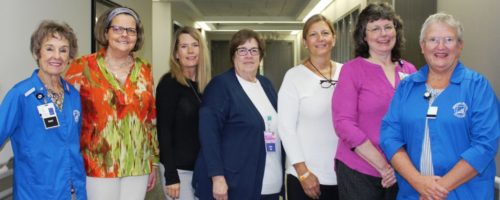Birthing Center Seeks Cuddler Program Volunteers

From left are the first Cuddlers to complete volunteer training, including Janet Granger, Laura Wroten and Sharon Dundon; Lynn Crouch, program educator and facilitator; and Cuddler volunteers Michelle Etherton, Diane Wanex and Linda Wharton.
The volunteers of the Auxiliary at University of Maryland Shore Medical Center at Easton have launched a new Cuddler Program for special needs babies who require hospitalization. Volunteers are being invited to apply.
Terry Stephan, Easton Auxiliary volunteer coordinator, says, “It is our pleasure to support this new, much-needed service for the little ones in our community. And the collaboration with Birthing Center staff has been amazing.”
Developed by the hospital’s Department of Women’s and Children’s Services in collaboration with the Birthing Center, the Cuddler Program supports special needs infants who are experiencing Neonatal Abstinence Syndrome (NAS) or withdrawal from the effects of maternal substance use.
Lynn Crouch, program educator and facilitator, says, “Research studies show that a non-pharmacologic (non-medicine) intervention for newborns with NAS has either prevented the use of medications or has decreased the dosage needed to assist these newborns during the withdrawal process.”
Cuddler Program volunteers must be members of the Auxiliary of the Memorial Hospital at Easton. Applicants undergo a strict vetting process and upon acceptance, they complete training that explains the benefit of “cuddling” for infants experiencing NAS and the science behind why this approach works.
Once admitted for labor and delivery, expectant mothers are tested for a wide variety of substances, so that medical care providers and nursing staff are prepared to care for each infant’s individual needs. In cases where a mother tests positive for drugs, infants are born requiring specialized care to support them through the withdrawal process. Newborns with NAS must remain in the hospital for at least five days to evaluate withdrawal and sometimes stay a month or longer for treatment.
Dr. Richard Fritz, a pediatrician with UM Shore Medical Group-Pediatrics at Easton, says, “This is a wonderful program to enhance the care of our special needs babies, decrease their length of stay and improve outcomes for both infants and their families. It is especially welcomed in a rural hospital and shows a community commitment to address addiction in families and the opioid epidemic with meaningful action.”
Cuddler volunteers support nursing staff and a newborn’s family by soothing and comforting the baby. Cuddlers’ responsibilities include holding, rocking, talking, singing and reading. Vounteer Cuddlers are typically scheduled at times when family are not present so as to support the newborn and parents without interrupting the family bonding process. Cuddlers are supervised by Birthing Center nursing staff and pediatric providers.
“The Cuddler Program helps provide the extra support and healing touch that these babies so desperately need to survive,” Crouch says.
The next Cuddler Program volunteer orientation course is scheduled for December. For more information about becoming a volunteer Cuddler with the Auxiliary of Memorial Hospital at Easton, contact Terry Stephan, volunteer coordinator, at 410-822-1000, ext. 5839, and leave a message.
Auxiliary volunteers at UM Shore Medical Center at Easton have launched a new Cuddler Program for special needs babies who require hospitalization. New volunteers are being invited to apply. From left are the first Cuddlers to complete volunteer training, including Janet Granger, Laura Wroten and Sharon Dundon; Lynn Crouch, program educator and facilitator; and Cuddler volunteers Michelle Etherton, Diane Wanex and Linda Wharton.
